 “Somewhere, something incredible is waiting to be known.”
― Carl Sagan
What better time to be alive and to be a writer, especially a science fiction writer, than right now. The universe is opening up to us and the eyes of mankind are turning to the heavens, gazing further and seeing more clearly than we ever have in the past.
Curiosity is on Mars, the Spitzer Telescope is taking images of the universe, the Kepler Telescope is looking for stars with planets orbiting them. Advances in medical sciences like: gene therapy, DNA mapping, laser surgery, artificial prosthetics. Computer advances like: artificial intelligence, micro processors, plasma displays, holographic imagery, and robotic advancements.
The most amazing of all though has to be the availability of all this information to anyone who cares to view it, to study it, to learn it. There are no limits to what we can know or learn or even imagine. There is only our self and our passion, ambition and desire to know.
For a science fiction writer, this is like the Garden of Eden at our fingertips. Just writing this post has my mind turning with four or five new story notions- all inspired by the ideas of these real science breakthroughs. Imagining the things I will get to see within my lifetime - things that as a child I could only imagine or dream of. It’s exciting to imagine, it’s exciting to speculate. Just think of everything that could happen, and how it will affect our lives...
The universe is opening up before our eyes, more now than at any point in our history. It’s ours to know, ours to imagine. It's ours to write.
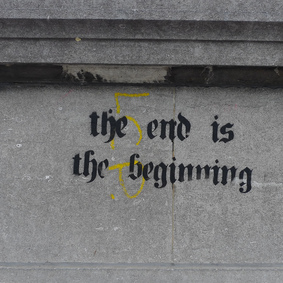 If you could get up the courage to begin, you have the courage to succeed.
· David Viscott
When I finished my first fantasy novel, I was on top of the world. It didn't matter to me if it ever got published or not, all that mattered was that I had completed it. In a way, I still feel that way. In another way, I really want to see it published. It represents a large chunk of my life.
After the first one was done, I didn't want to look at it again for a long time. I sent it out and pretty much paid it no more attention. It came back. I sent it out. It came back. I didn't want to think about re-working any part of it. But now, over a year later, with my second story nearly complete, I wonder if it might be worth digging back into that first one again and seeing if there is anything I can do to improve it. I've learned a great deal in the last year or so. Some of those things have been eye opening.
I have a strong feeling I can make that first book better, but I'm torn between whether or not I should. It's a good story. It deals with a complicated plot line and some interesting character issues. It's exactly the type of book I love reading. But there are other stories in me as well and they are pounding on the walls to get out. They want and deserve their turn in the spotlight.
It's a tough decision to make.
Right now I am completing my final edit on the Seven Circles story. I've promised myself not to decide my next project until the current one is finished, but I'm still wondering about it.
There is another story in my mind right now. Parts of it have been dancing in the corners of my imagination for several weeks now. I'm looking forward to writing it when this one is done, but I know it's going to be a big undertaking. Likely at least a full year from start to completion, but it promises to be a good story. A little darker maybe; a bit more complicated; slightly sinister in nature; strong morality undertones in the tightly woven plot lines. It's exciting to think about it. I know it's going to be great fun to write.
Yet I still wonder about that first manuscript.
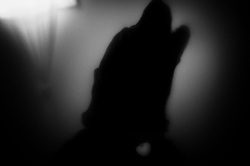 “You grow ravenous. You run fevers. You know exhilarations. You can't sleep at night, because your beast-creature ideas want out and turn you in your bed. It is a grand way to live.”
― Ray Bradbury
Since the first of the year I’ve been on a bit of a break. Mostly I’ve been doing a little editing, catching up on some reading, and spending some time with my family. I sort of felt like I deserved a break after finishing NaNoWiMo in November, surviving the mayhem of the holidays, and negotiating a remarkably crazy January at work. I was tired and my mind just wanted to sleep; to shift gears and simply coast for a while.
Ever wake up from a deep sleep because you hear a dog barking? Everyone else in the house sleeps right through it, but you can't. It's impossible to slip back into blissful slumber until the animal stops, but it won't. So you just lie awake and listen to it.
Everyone needs a rest now and then. It’s good for the mind, body and spirit. But here it is, the beginning of March, and I’ve been “sleeping” for well over a month and that damn dog just won’t shut up. As much as I would like to roll over and doze back off, my mind only hears the dog. I know it’s not going to shut up until I get up and let it back in the house. After all, it is my dog.
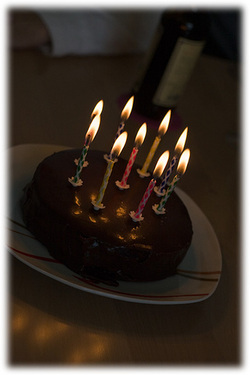 "I wish you a wrestling match with your Creative Muse that will last a lifetime. I wish craziness and foolishness and madness upon you. May you live with hysteria, and out of it make fine stories — science fiction or otherwise. Which finally means, may you be in love every day for the next 20,000 days. And out of that love, remake a world.”
― Ray Bradbury
It's a New Year once again and people are thinking about resolutions. I'm not, but some people are.
Instead of a resolution, I want to make a wish. Not just for me, but for every writer out there in the world, regardless of whether they are just beginning or have been writing for years and years:
Just as Bradbury did - I wish you madness (and all the writing bliss that accompanies it).
Write often and have a safe and happy holiday.
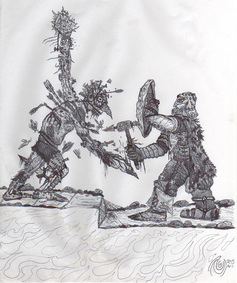 The big secret is the ability to stay in the room. — Ron Carlson
There are days when staying in the room is indeed the most difficult part of writing. Life pounds on the door; thoughts scurry about in opposing directions; responsibilities shout through the walls, reminding us of forgotten or postponed duties; Imagination sits on a chair in the corner and laughs hysterically without muttering a word. It's difficult to shut out the distractions and simply concentrate on the writing.
But some days it isn't staying in the room that's difficult. For me getting into the room tends to be the hardest part.
I have an office. Once I sit down in it, writing becomes easier. It's noting fancy, just a spare bedroom that is no longer being used for sleeping. The desk is a very old table I bought at an auction. The chair was a Christmas present. I have several book shelves that my father gave me when he cleaned out his garage. They hold a mish-mash of reference and science fiction books, along with some classics. There are also old magazines, a set of encyclopedias, and way too many office supplies. The room doesn't look like much, but it's comfortable and it's conducive to writing. The biggest problem I have is walking up the stairs to get to it.
For years I dreamed of having a designated writing space; of being able to have a room completely dedicate to the sole task of creating. Over the years, I've written in the dining room, the living room, the bed room, the front porch, and occasionally the back yard and the car. It's difficult to stay focused when all the distractions of life are neatly displayed no matter where your gaze falls.The office was to be my sanctuary, my place to escape the world and all of the things in it that steal away bits of my attention and inspiration. This designated room minimizes those effects.
But going there, and sitting down in that chair, is sometimes more difficult than any other aspect of writing. It's like the creative monster in my mind dreads that place of order and business. The lack of non-writing related chew toys is frightening for a monster of such mythical proportions as my often maddening beast and muse, Chaos. It fights entering the room like the dog fights my attempts to put him in the bathtub. I try to make it an inviting place, but that isn't always enough. Chaos is very smart. The room means it's time to work. Monsters don't always like to work. At least my monster doesn't like to sometimes. There are claw marks on the door frame to prove it.
But writing isn't an occupation for the faint of heart. It's an obsession fueled by passion and commitment. It's a frame of mind that requires time and effort and sometimes a whip and a chair.
But when all else fails, it helps that I keep a big bowl of candy on my desk.
 “It's hard for me to believe that people who read very little - or not at all in some cases - should presume to write and expect people to like what they have written. Can I be blunt on this subject? If you don't have time to read, you don't have the time - or the tools - to write. Simple as that.”
- Stephen King
The best advice I have ever received on writing was also the simplest: READ.
Read anything and everything. Read novels and short stories; read newspapers and magazines; read non-fiction and fiction; read poetry, plays, song lyrics, joke books, billboards. Read classic literature, pulp fiction, and the manual to your newest electronic device. Read. It doesn’t matter if what you read is well written or crap. There is something to be learned from all of it.
Like any trade, writers need tools to practice their craft. Rather than hammers and saws or wrenches and screwdrivers, we use tools such as vocabulary, punctuation, and sentence structure. While these are things we begin to acquire as very small children, it can take a lifetime of study and practice to use them well. I like to think of reading as part of a writer’s apprenticeship. The more I read the more I learn about writing. Even more importantly, the more I read the more I understand about writing.
Here’s another analogy, not because I think you don’t understand, but because I enjoy writing analogies. They’re fun.
Reading is like going to the grocery store to stock the pantry in your kitchen. If you want to prepare a great meal, then you probably want to stock items from more than one department in the store. With writing though, the ingredients you buy don’t ever spoil. They may need refreshed from time to time, but once you buy them, you generally keep them for all of your life. The more you read, the more items you are putting into your writing pantry. The more writing ingredients you have, the tastier the meals you can prepare for your readers.
Reading expands vocabulary and imagination; it entertains and informs; it takes us outside of our individual world and shows us what does or could lie beyond the limits of ourselves. Good writing shows me how to do things right or better, while bad writing teaches me what to avoid. Non-fiction informs me and Fiction opens doors in my imagination that I may not have been previously aware of. I learn something from everything I read, even when I’m not trying to. I can’t help it.
I’ve gotten story ideas from advertisements and magazine articles; I’ve done research in biographies and encyclopedias; I learned how to better pace my stories by reading poetry. The amazing thing is, I don’t know I’m learning these things until I sit down to write. It’s then that the rewards are reaped.
So if you want to write, you need to read. Simple as that.
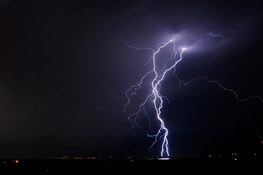 “The difference between the almost right word and the right word is really a large matter – it’s the difference between the lightning bug and the lightning.”
- Mark Twain (Samuel Clemens)
As a writer, the power of words fascinates me. Maybe that’s true of all writers and maybe it’s not. I mean really though, who doesn’t love the word –sensuous ? It has power, it has grace, and spoken with the proper articulation, it can immediately get you the attention of the four or five strangers who were previously ignoring you in the elevator.
It works in writing as well.
Word choice is such an important part of telling a story, and one so often not given the proper amount of attention. It’s the art in the craft. Words carry weight and establish rhythm; they convey thought and provoke emotion; they entice, entertain, and carry a reader to the realm of the writer’s creation. Through words, all of imagination can become real, if only for a brief moment in time.
As readers, we desire surrender of our current reality and rely on the writer to give us a new one; to immerse us in a time and place beyond ourselves.
As writers, we create realities and populate them with the creatures and characters of our unique imaginations. It is with words we breathe life into those realities and capture them upon the page. There they remain in a state of eternal suspension until they are read. It is within the readers mind, his or hers imagination, that the captured life is released and finds its unique existence.
There is magic in reading a well written story, no matter the genre. Magic, woven by the words we choose and the way we use them, place them, punctuate them. The strength of that magic carries the story. The more precise our selections, the more real our alternate realities feel to a reader. While the almost-right words can leave that reality flat and featureless, the right words can infuse it with life and submerse a reader so completely they forget it's only imagined.
Pursuing the right word is pursuing the art of being a great writer. It should be taken seriously.
Knowing what the right word is, isn’t always an easy task. It takes thought and practice. But when it’s right, it makes all the difference in the world.
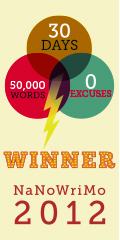 One hasn't become a writer until one has distilled writing into a habit, and that habit has been forced into an obsession. Writing has to be an obsession. It has to be something as organic, physiological and psychological as speaking or sleeping or eating.
-Niyi Osundare
TGIO – The phrase of NaNo participants around the world today. “Thank God it’s over!”
Strangely enough I’m not chanting it. (Whispering it in the dark corners of my creepy subconscious – maybe, but definitely not shouting it from the rooftops.)
Going into the month of November, I had no idea what I was getting into. I thought it would be a nice change of pace and a break from my monotonous editing work on my current fantasy novel. I thought it would be fun. In all honesty, there were moments when it really was fun. There were moments when it really wasn’t as well.
I told myself if I got out 30,000 words I would be happy with my effort. After all, I was just going to hash out a rough draft; work up the bones for my next novel. One of the guidelines for NaNo is to turn off the inner editor and just freely write. After weeks of picking apart my current story line by line, parting company with my inner-editor was holding massive appeal to me. I was having no difficulty at all with the idea spending 30 days on my own with my writing and a crude outline of a story that had been rippling the water of my imagination for nearly a year now while its older sibling enjoyed the lime light of my undivided attention. At least in that
respect I was right. It was a fantastic diversion.
But at 11:27 pm last night (Nov. 30), when I closed my file at 50,106 words, the only thing I experienced was relief. I immediately went on line and had the manuscript validated by the NaNoWriMo website, which brought me to a strange little video of a bunch of strangers congratulating me. It was good they were there because the rest of my house was sound asleep, including the dog. It would have felt odd to celebrate alone.I had finished the challenge and it felt good.
This morning I sat down once again at my computer, as you can see, and began to ask myself: What did I learn this month? I just spent 30 days working on a story that very likely will get little if any attention for at least another month or two while I go back to wrapping up my ‘Seven Circles’ manuscript. Was it ultimately worth it?
My answer: YES
I’ve written almost every day this month, with the exception of a couple of days around Thanksgiving when we had family in from out of state. Other than that, I’ve developed a writing time nearly every evening, for around two hours. The more often I indulged, the easier it got. I’ve developed a much more stable writing habit. And with the end counted down for me - day by day - I was able to stay focused on the work and the story that was unfolding before me. So while I didn’t get to a lot of write-ins and only got to meet about six other participants, I did improve my writing habit and now have 50,106 words towards completing my next novel. Not a bad take for the month.
Will I do it again next year? I can’t say for certain, but I think I might.
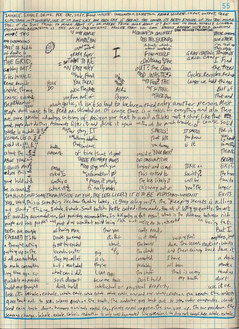 "I write for the same reason I breath - because if I didn't, I would die."
- Isaac Asimov
I don't know for certain, but I suspect that every great writer feels this pull, at least from time to time. It's a feeling akin to tightness in the chest, combined with a racing of the mind and a maddening of the intellect as well as the spirit. Once the story, or the thought, or the emotion, idea, or image takes hold of the mind, there is no denying the impulse, the raw and carnal need, to express the mind's obsession before any hope of calmness or ordinary life can return. To deny the urge is paramount to denying the body air.
It is a maddening feeling to experience an unsolicited need so great as that call from within to write. There is also no greater feeling than to answer that call and find the rewards of the labors to be spectacular in their completed form.
I feel, at least for myself, it is an addiction; a need that manifests itself in both physical and psychological forms. Certainly it can take over a life just the same as an addiction to alcohol or drugs. Allowed to reach obsessive proportions, it can even do as much damage. Yet to be successful each writer must come to terms with it. Welcoming it into our lives and accepting it as a natural part of what makes us uniquely who we are.
For me being a writer has never really been a choice. Even when I tried to deny it, swore off it cold turkey, I could never beat the addiction. I was miserable in my life and in my mind and soul. I went through days, weeks and months trying to understand life without the release of thought upon paper. It was hell.
To this day I still don't understand how non-writers survive in this world. I have to write. It is my happiness, my sanity, my vice, my passion and my desire. It is my air.
|









 RSS Feed
RSS Feed